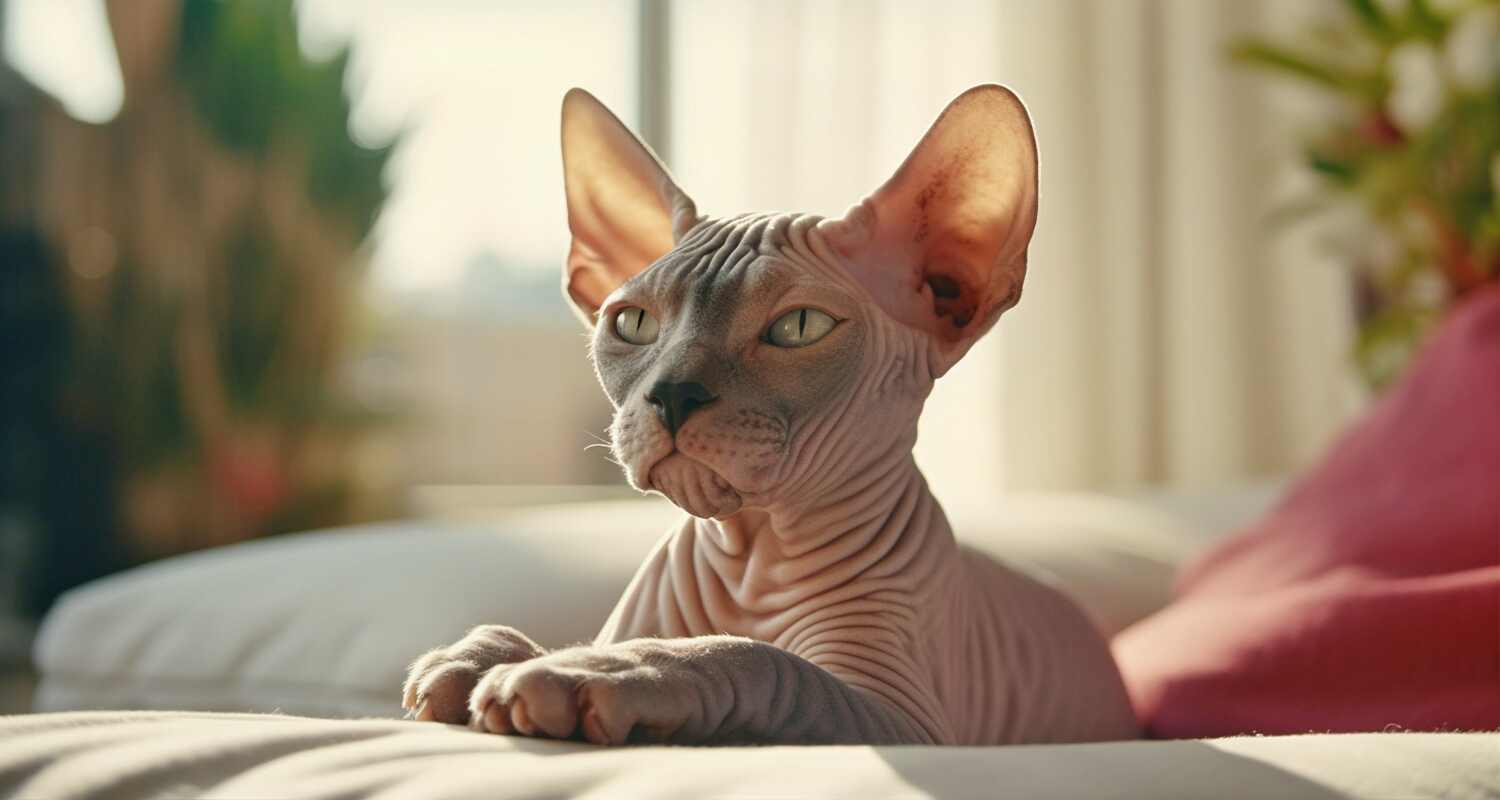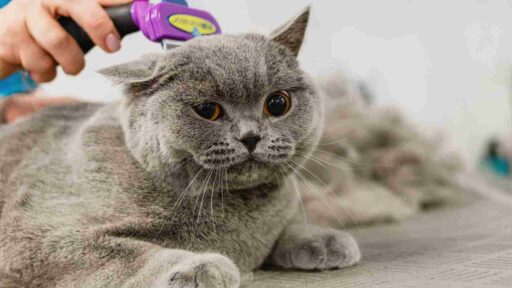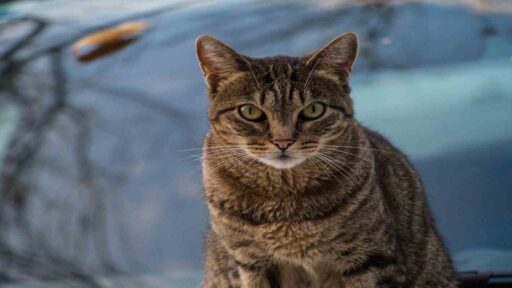Fat Sphynx cat refers to a Sphynx breed of cat that is overweight or has a larger body size compared to the typical build of this breed.
Sphynx cats are usually recognized for their slender and sleek appearance, but some individuals within the breed might carry extra weight, leading to a fuller or overweight physique.
Fat Sphynx cat – Characteristics
Here are some characteristics or traits often associated with overweight or fat Sphynx cats:
- Heavier Build: Fat Sphynx cats tend to have a more substantial body size, compared to the typical lean and slender physique of the Sphynx breed.
- Roundness: They might exhibit roundness or a fuller appearance around the abdomen, limbs, and face due to excess weight.
- Reduced Activity: Overweight Sphynx cats might show decreased activity levels, be less inclined to play, or have limited mobility due to the extra weight.
- Health Concerns: Obesity in Sphynx cats can lead to health issues such as joint problems, diabetes, heart conditions, and skin problems due to difficulty grooming.
- Care Needs: Managing the diet and exercise regimen becomes crucial, for overweight Sphynx cats to maintain a healthy weight and overall well-being.
It’s important to note that maintaining a healthy weight is essential for the well-being of any cat, including the Sphynx breed. Monitoring diet, providing regular exercise, and seeking veterinary advice for weight management are vital for keeping them healthy and happy.
Differences Between Fat Sphynx Cat and Other Breeds
Here are some differences between overweight or fat Sphynx cats and other breeds regarding weight-related considerations:
- Body Type: Sphynx cats, even when overweight, maintain their distinctive hairless appearance, displaying a fuller physique with roundness in certain areas due to excess weight. In contrast, overweight cats of other breeds might show a more generalized increase in body size, potentially obscuring their breed-specific features.
- Skin Texture: The hairlessness of Sphynx cats makes their excess weight more visible, as their skin folds and wrinkles might become more pronounced with added weight. Other breeds may have fur that can hide or obscure weight gain to some extent.
- Exercise Needs: While all breeds benefit from exercise, Sphynx cats, even when overweight, might require more encouragement or structured activities due to their potentially reduced activity levels caused by excess weight. Other breeds might display a more typical level of activity, regardless of their weight.
- Health Implications: Overweight Sphynx cats, like overweight cats of other breeds, face health risks such as joint issues, heart problems, diabetes, and skin conditions due to excess weight. However, the visibility of these issues might be more pronounced in Sphynx cats due to their hairless nature.
Ultimately, while overweight or fat Sphynx cats share similarities in weight-related concerns with cats of other breeds, the hairlessness and unique appearance of Sphynx cats might make weight issues more apparent and might require specialized care considerations
Are Sphynx Cats Prone to Obesity?
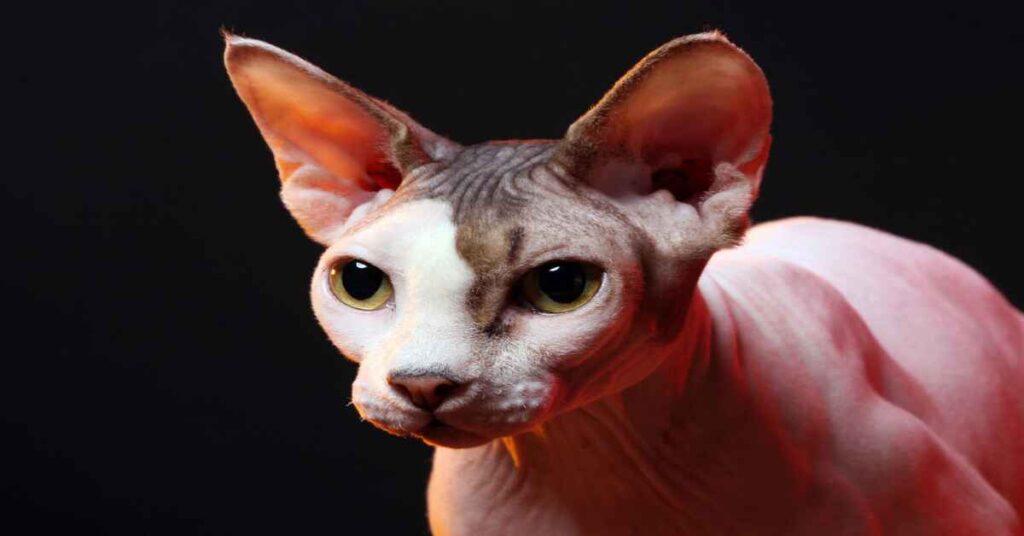
Sphynx cats, like any other breed, can be prone to obesity if their diet and exercise aren’t properly managed. While they might not have a predisposition to obesity solely based on their breed, certain factors can contribute to weight gain:
- Appetite: Some Sphynx cats have hearty appetites and may overeat if portion control isn’t maintained.
- Inactive Lifestyle: If not provided with adequate opportunities for exercise and play, Sphynx cats can become less active, leading to weight gain.
- Medical Conditions: Underlying health issues or conditions can contribute to weight gain, so it’s crucial to rule out any medical reasons for increased weight.
Regular monitoring of their diet, portion control, and engaging them in play and physical activities can help prevent obesity in Sphynx cats. Consulting with a veterinarian about a suitable diet and exercise plan is advisable to maintain their health and prevent weight-related issues.
How Big Will My Sphynx Cat Get?
While Sphynx cats generally weigh between 6 to 12 pounds (2.7 to 5.4 kilograms) as adults, their size can vary based on several factors:
- Genetics: The size of a Sphynx cat can be influenced by its genetic background. Some lines or breeds might produce larger or smaller individuals.
- Gender Differences: Males tend to be larger and heavier than females in most cases. Male Sphynx cats might reach the higher end of the weight range compared to females.
- Growth Rate: Sphynx cats usually reach their full adult size by around 12 to 18 months. However, individual growth rates can vary, and some cats might continue to fill out or gain weight slightly after this age.
- Health and Nutrition: Proper nutrition and health play a crucial role in a cat’s growth. Maintaining a balanced diet and ensuring they receive adequate exercise contribute to healthy growth and weight.
- Spaying or Neutering: The timing of spaying or neutering can sometimes affect a cat’s growth rate, with early procedures potentially impacting their final size.
While the average weight range provides a guideline, it’s essential to consider individual variations. Regular veterinary check-ups can help monitor their growth and ensure they’re developing appropriately. A balanced diet, proper care, and attention to their overall health are key factors in determining the size a Sphynx cat will reach.
Are Sphynx Cats Aggressive?
Sphynx cats are not inherently aggressive. In fact, they’re known for their affectionate and friendly nature. They tend to be social, and outgoing, and enjoy interacting with people and other pets. However, as with any cat breed, individual personalities can vary. Aggression in Sphynx cats, when present, is often due to factors such as:
- Social Nature: Sphynx cats typically display an amiable and affectionate demeanor. They enjoy human interaction and often seek companionship. Their social nature generally makes them less prone to aggression compared to some other cat breeds.
- Individual Differences: Each Sphynx cat has a unique personality. While most are friendly and outgoing, some individuals might exhibit more assertive or dominant behavior, which could be mistaken for aggression.
- Triggers for Aggression: Aggression in Sphynx cats can stem from various factors, including perceived threats, fear, stress due to changes in their environment, or discomfort caused by health issues.
- Communicative Behavior: Cats, including Sphynx cats, might display aggression as a form of communication. This behavior can arise if they feel threatened, cornered, or uncomfortable.
- Early Socialization: Proper socialization during kittenhood is crucial in shaping a Sphynx cat’s behavior. Cats exposed to various environments, people, and other animals tend to develop into well-adjusted and less aggressive adults.
- Handling and Training: How a Sphynx cat is handled and trained also influences its behavior. Positive reinforcement methods and gentle handling can help mitigate aggressive tendencies.
- Health Considerations: Aggression in cats can sometimes signal an underlying health issue. Pain, discomfort, or illness might lead to defensive or aggressive behavior.
Understanding individual personalities, providing a safe and enriching environment, early socialization, regular veterinary care, and addressing any behavioral or health concerns can contribute to maintaining a Sphynx cat’s friendly and non-aggressive nature.
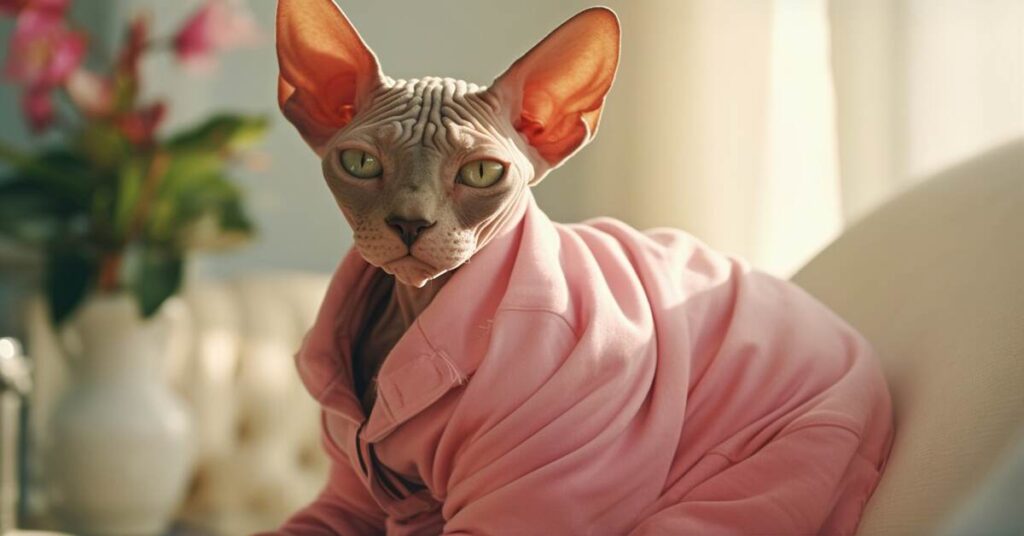
Fat Sphynx Cat Care
Caring for a fat Sphynx cat involves several considerations:
- Dietary Management: Consult a veterinarian to create a tailored diet plan for your cat. Ensure controlled portions and a balanced diet to manage weight without compromising essential nutrients.
- Exercise: Encourage gentle play and physical activity suitable for your cat’s size and health condition. Engage them with toys or interactive activities to promote movement and exercise.
- Regular Veterinary Check-ups: Schedule regular visits to monitor your cat’s weight and overall health. Your vet can offer guidance on weight management strategies and identify any underlying health issues contributing to weight gain.
- Environmental Enrichment: Stimulate their minds and encourage activity by providing scratching posts, climbing structures, or puzzle feeders. Mental stimulation can prevent boredom-related overeating.
- Skin Care: Maintain proper skin hygiene. Regularly clean their skin folds or wrinkles to prevent irritation or infections, a common concern in overweight Sphynx cats.
- Weight Loss Plan: Work with your veterinarian to create a gradual weight loss plan. Rapid weight loss in cats can lead to health complications, so a slow, controlled approach is crucial.
- Consistent Routine: Establish a consistent feeding schedule and avoid excessive treats or high-calorie snacks. Monitor their progress regularly and make adjustments as advised by your vet.
- Health Monitoring: Keep an eye on their overall health and behavior. Monitor for signs of discomfort, changes in mobility, or any other health concerns that might arise due to excess weight.
By following a tailored diet, encouraging appropriate exercise, maintaining skin hygiene, and prioritizing their overall health, you can effectively care for your fat Sphynx cat and support them in achieving a healthier weight. Consulting with a veterinarian is key to creating a comprehensive care plan tailored to your cat’s specific needs.
Why Is The Sphynx Cat So Expensive?
Several factors contribute to the relatively high cost of Sphynx cats:
- Breeding and Rarity: Sphynx cats are a relatively rare and specialized breed. Breeding Sphynx cats involves careful selection and specific breeding practices to maintain their distinctive hairless trait. The scarcity and demand for these cats contribute to their higher price.
- Health Testing: Responsible breeders conduct extensive health testing to ensure the well-being of their Sphynx kittens. These tests add to the overall cost of breeding and raising healthy cats.
- Care Requirements: Sphynx cats require special care due to their hairlessness. This includes regular skin care, maintenance, and considerations for their sensitivity to temperature changes, adding to the cost of their care.
- Quality Breeding Standards: Reputable breeders invest in maintaining high-quality breeding standards, which include proper nutrition, housing, veterinary care, and socialization for the kittens. These standards contribute to the overall cost.
- Initial Expenses: The cost of acquiring a Sphynx cat also includes initial expenses such as vaccinations, microchipping, spaying/neutering, and other necessary procedures.
Due to these factors, purchasing a Sphynx cat from a reputable breeder often involves a higher initial cost compared to other breeds.
Conclusion
In conclusion, caring for a fat Sphynx cat requires a multifaceted approach that encompasses diet management, exercise, regular veterinary check-ups, skincare, and environmental enrichment.
Tailoring a balanced diet, promoting gentle exercise, maintaining skin hygiene, and monitoring their health are key elements in managing weight and ensuring their overall well-being. Consistency, patience, and collaboration with a veterinarian are crucial to helping your cat achieve a healthier weight and a happier, more active life.

